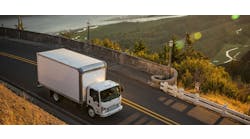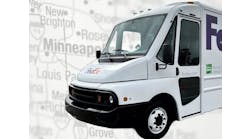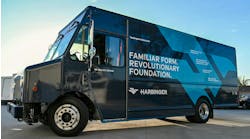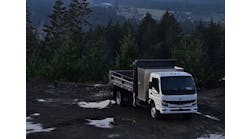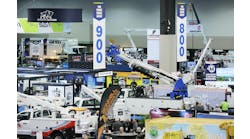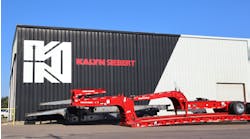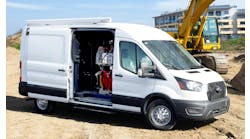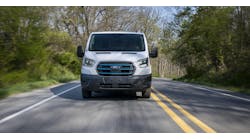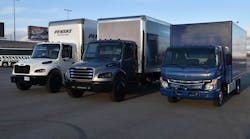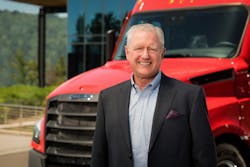Daimler Trucks North America is well positioned for truck electrification because, simply, the company is the longstanding heavy-duty market leader, and “newcomers” to truck manufacturing don’t appreciate the finer—and most critical—aspects of building a vehicle to spec that will do the job a customer needs, as new DTNA President and CEO John O’Leary explained.
“This gets to the crux of a lot of things. There are companies out there that are, let's say, kind of dabbling in electric trucks. I call them ‘science projects’,” O’Leary told Trailer/Body Builders. “They're not existing players in the truck market, but they decided, ‘hey this is a very nice addressable opportunity for growth and for revenue in the future, so I'm just going to do it.’”
But that plan unravels, for instance, when the newcomer starts taking calls from truck equipment manufacturers who need to make their truck bodies and accessories fit and perform on the newcomer’s chassis.
“There’s a wide variety of customization that's required to deal with the upfitting requirements, the locations of PTOs and the draw of power that's required to operate the bodies—it gets pretty complex in a hurry,” O’Leary said. “I always tell people we've mastered the art of ‘mass customization.’
“We're talking about building 200,000 trucks and buses a year just in North America. And those are not cookie-cutter trucks; there's a huge variety. That's something that some of the newcomers to the industry still have yet to even think about—they’re still thinking about just how to commercialize the technology—but mass producing that technology is a whole different problem, a much bigger problem. So I feel good about where we stand.”
More broadly, the early adoption of electric trucks in the vocational space will come in those applications where the equipment design and upfit is less complicated, O’Leary continued. Other applications will have to wait.
“That's a big challenge, and that's not going to be easy,” he said. “But smart people will come up with solutions eventually. Like everything else, everybody goes to the easiest application first; those will be the ones that everybody targets—especially the newcomers. And then the more difficult ones will come later.”
Speaking of the recent restructuring of Daimler’s global truck business following the split from Mercedes-Benz, O’Leary suggested that North American customers clearly will benefit.
“When you talk of DTNA, we can focus exclusively on trucks now in our markets and we don't have to worry about trying to convince an operating committee of largely passenger car guys about why this investment is a good one, or why this truck market is different than that passenger car market,” he said. “For us to be able to just totally focus on our customers, on our products, and on offering a great TCO, I think is really great for us.”
Faced with ongoing production challenges during a period of surging equipment demand, O’Leary characterized managing the supply chain as “a knife fight,” even with the regional and global sourcing advantages Daimler provides.
“We understand that customers, especially when their businesses are going strongly, want those trucks, so we're doing everything we can to get those trucks in their hands with the minimal amount of disruption,” he said. “I think our purchasing team has done a really great job. Our interruptions have been limited to a day here, a few days there. I almost have become immune to the bad news because the team is so talented that they usually resolve it by the end of the day, or a few days later.
“But it's a huge challenge for us, for the industry, and for a lot of industries right now. All you can do is just take it one day at a time, one part at a time and go after it, and do your absolute best.”

